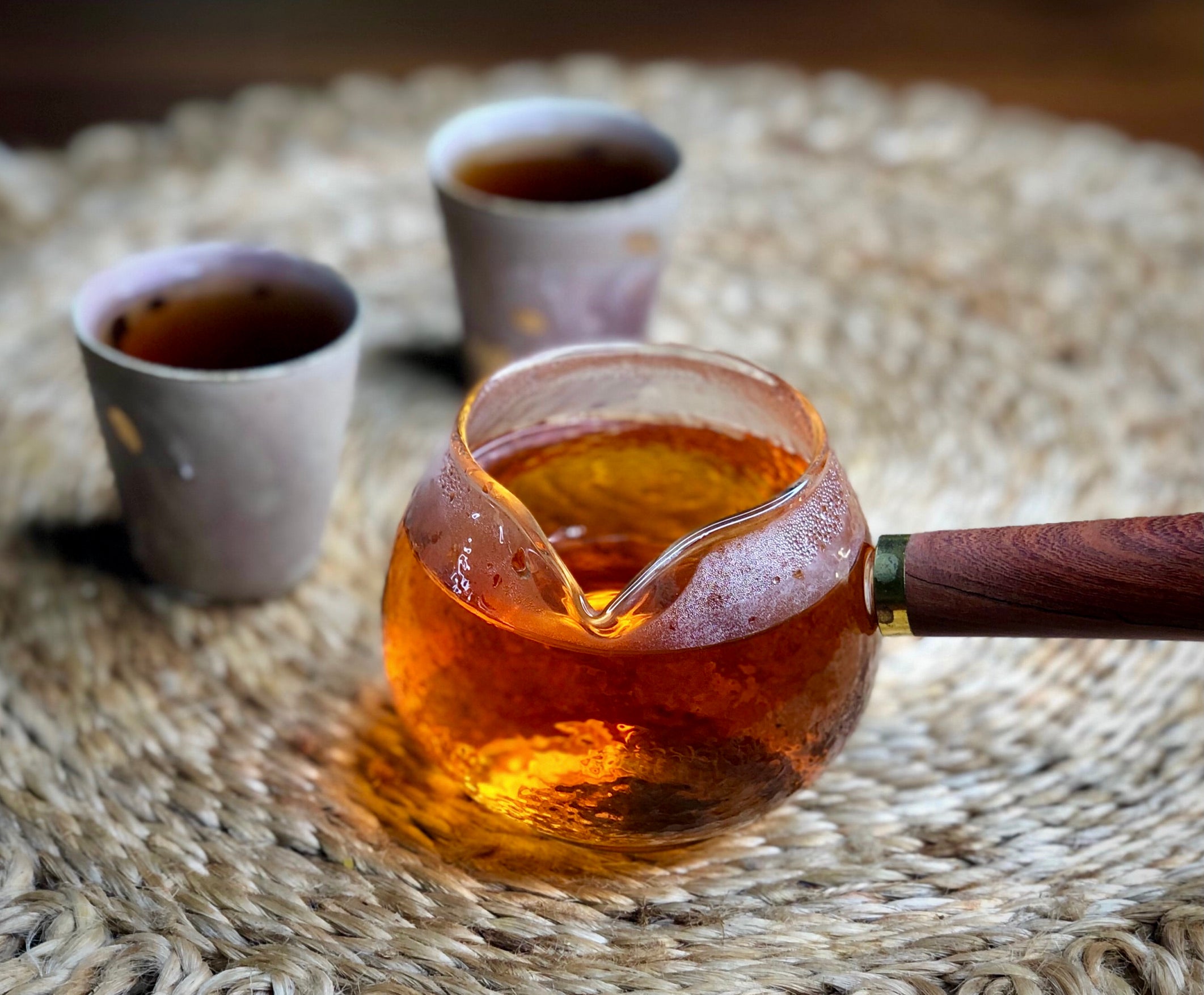
Mr. Gao frying leaves with his bare hands
I spent several days with Mr. Gao Fa Chang in his home in Yiwu, drinking his tea, and listening to his stories about the local tea industry. Mr. Gao is a native of Xi Kong village, in Yi Bang, where there are many old tea trees, some over 1,000 years old. He served me a 2011 spring gushu from Yi Bang that was exquisitely soft & sweet, with no bitterness or astringency at all. This was followed by a 2009 spring gushu from Xi Kong that was everything I look for in a tea – clean, fresh & flavorfull, with a hint of aged taste, and that salivation inducing effect that the Chinese call “sheng jin” 生津.

Mr. Gao's 2006 private pressing of 1,000 year old Xikong trees

He then cracked open a 2006 cake made from 1,000 year old trees he picked in Xi Kong. He steeped this for an extra long time, almost competition style, as this is the best way to detect differences in tea. The concentrated 1,000 year old Xi Kong tea was very bitter at first, but mostly at the back of the throat, and the bitterness faded away very quickly, and without any astringency. Lastly, for an extreme comparison, he served a tai di cha which he had also picked near his school & processed himself. Mr. Gao told me he only processes tai di cha to teach his guests how to taste the difference between gu shu and tai di. The tai di cha had a nice floral aroma, but it was bitter with a strong astringency on the tongue, and an unpleasant hairy feel in the throat. We continued to drink the 1,000 year old Xi Kong tea, enjoying its amazing hui gan from the 8th steep through to the 20th.

Clear felling natural forest cover in Yiwu
As a prominent local spokesman & puer enthusiast, what concerns Mr. Gao most, is the loss of natural forest cover. To raise living standards, the Government is releasing land on the cheap, and encouraging farmers to plant rubber & banana plantations. Farmers buy virgin forest at low prices of 8 RMB per mu (roughly $20 US dollars per acre). The trees are clear felled and the land scorched & terraced, before planting the new cash crops. “They are burning our national treasure warehouse!” Mr. Gao exclaimed.

Young banana plantations in Yiwu
As with the pace of development all across China, Yunnan’s forest are disappearing fast. With a widening gap between rich industrialized cities and rural poor, the Government is encouraging farmers to move to the cities, so small family land plots, can be consolidated in larger, more efficient farms. This also helps to compensate for China’s poor welfare system, as family members that move to cities to work, often provide financially for the family back in the village, and eventually pull more family members to come live & work in the city. The Government wants to bring the rural population out of poverty, because providing economic development and preventing social unrest is their key mandate. But the changes in land management policy are more economic in nature and have not taken into consideration the long term environmental effects. I have seen the same thing happen in Malaysia and Indonesia, where in a few generations, monoculture palm oil and rubber plantations have replaced much of the natural rainforest. It pains me that something as dear to my heart as puer, is under threat from lowly commodities like rubber & bananas!
As a prominent local citizen, Mr. Gao believes the books & articles he’s written have influenced the Tea Research Institute’s policy to recommend farmers keep 12 native trees / mu. These trees provide habitat for birds & spiders that reduce insect pests, and their leaf fall prevents weeds. But encouraged by rising tea prices and cheap government land, many tea farmers have also cleared forest to plant dense monoculture “tai di cha” (terraced plantation tea), which he believes is contributing to making the air too dry & creating an explosion in pests. These stunted plants then need fertilizer to grow, and pesticides to kill the bugs. “The roots of a tea plant are roughly proportional to the plant’s height.” Mr. Gao explained. A 7-8m tall ancient tree, will have developed a root system that reaches 7-8m deep. Tai di cha is grown from cuttings, with shallow root systems that reach only 1-2m deep, limiting the minerals they can draw on, so the tea is more bitter and astringent. “The tea has no natural taste!” Mr. Gao sighs.
In 2008 Mr. Gao published an open letter to the premier Wen Jia Bao, that attracted the attention of several journalists, who were coming to Yunnan and wanted to interview him. But the government handlers told the journalists Mr. Gao had gone crazy, and was unreachable, in hospital. “I’m not crazy,” Mr. Gao laughs, “The society is crazy!”
I really admire Mr. Gao’s passion for puer, and his dedication to protecting the environment. He wants to preserve the natural beauty of the landscape, and encourage tourism. In a country where being an outspoken critic can have repurcussions, Mr. Gao is a brave & indispensable man.

